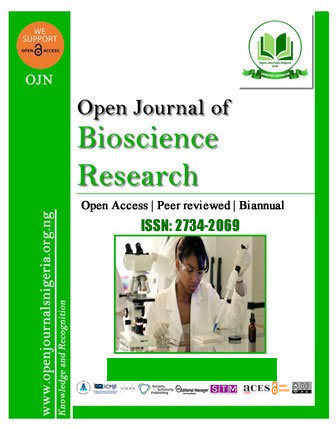AVOGADO PEEL POLYPHENOLIC-FUNCTIONALIZED KERATIN-STARCH COMPOSITE: A NOVEL APPROACH TO EXTENDING SHELF LIFE AND ENHANCING POSTHARVEST QUALITY OF TOMATOES
DOI:
https://doi.org/10.52417/ojbr.v5i2.727Abstract
There is increasing research interest in the development of edible films and coatings that incorporate plant-derived antimicrobials to make perishable foods last longer and taste better. This study developed a bioactive keratin-starch composite (3:27 v/v) using varying concentrations (0.2–1.0 mL v/v) of polyphenolic extract of avocado peel. The keratin-starch composite was fabricated from 5% (w/v) keratin solution and 5% (w/v) starch solution. The functionalized keratin-starch composite was applied as a coating on light red-colored tomato fruits and stored at 25.0 ± 2.0 °C, 67.0 ± 2.0 relative humidity, and 12 h day and night cycle for nine days. Loss in weight, as well as changes in the physicochemical attributes (pH, titratable acidity, brix value, ascorbic acid and lycopene contents, and polyphenol oxidase activity), were analyzed on days 0, 3, 6, and 9 to ascertain the effects of the coating on the quality and shelf life of tomatoes. Tomatoes treated with avocado polyphenolic-extract enriched keratin-starch composite exhibited significantly lower weight loss, lycopene content, and polyphenol oxidase activity compared with uncoated tomatoes. Additionally, the treated fruits showed improved pH stability, elevated titratable acidity, and enhanced ascorbic acid retention, compared to those coated with the base keratin-starch composite for nine days. Overall, the tomatoes coated with keratin-starch composite functionalized with 1.0 mL avocado peel polyphenolic extract exhibited the best quality attributes after the 9-day storage period. These results underscore the potential of avocado peel polyphenols as a sustainable bioactive additive for biopolymer coatings, offering an eco-friendly approach to make fresh produce stay longer on the shelf while maintaining their nutritional quality
Published
How to Cite
Issue
Section
Copyright (c) 2024 Eidangbe & Oluba

This work is licensed under a Creative Commons Attribution 4.0 International License.





















